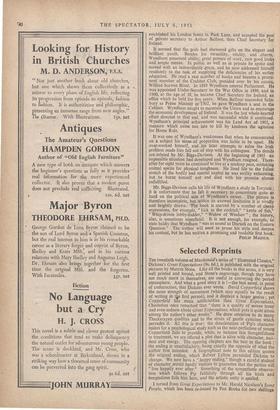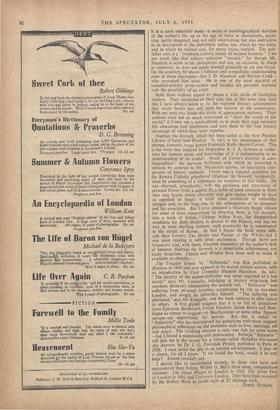Selected Reprints
THE twentieth volume of Macdonald's series of " Illustrated Classics," Dickens's Great Expectations (9s. 6d.), is published with the original pictures by Marcus Stone. Like all the books in this series, it is very well printed and bound, and Stone's engravings, though they have not much merit in themselves, are useful in conveying the periods atmosphere. And what a good story it is 1—the best novel, in point of cortstruction, that Dickens ever wrote. David Copperfield shows the same strength of movement (which may equally be the result , of writing in tip first person), and it displays a larger genius ; yet. I Copperfield has more artificialities than Great Expectations. Chesterton once remarked that " there is a quality of serene irony and even sadness about Great Expectations, which puts it quite alone among the author's other works." He drew attention to its many Thackerayan qualities and to the strain of gentle cynicism which pervades it. All this is true : the, deterioration of Pip's character makes for a psychological study such as the near-perfection of young Copperfield fails to provide, while, to balance this thoughtfulness in treatment, we are offered a plot that is alive with character, inci-. dent and energy. The opening chapters are the best in the book ; the ending is unsatisfactory, being exactly the opposite of what the author first intended. A biographical note to this edition quotes the original ending, which Bulwer Lytton persuaded Dickens to change. We now have a " happy ending," though a careful student of character _would hardly venture to guarantee that the parties will " live happily ever after." Something of the sympathetic observa- tion which follows Pip faithfully through all his trials and temptations fails him here, and the artistic unity is spoiled.
I turned from Great Expectations to Mr. Harold Nicolson's Some People, which has been re-issued by Pan Books for two shillings• It Is a most enjoyable book—a series of autobiographical sketches of the author's life up to the age. of forty or thereabouts, partly true, partly imagined, and not only entertaining but also instructive in its description of the diplomatic milieu into which he was born, and in, which he trained and, for many years, worked. The pub- lisher calls it a " twentieth-century classic of incisive humour." I do not much like that solitary adjective " incisive," for though Mr. Nicolson is acute in his perceptions and can, on occasion, be sharp in comment, he does not apply himself primarily to cut and thrust. On the contrary, he shows a tolerant and sympathetic understanding even of those characters—like J. D. Marstock and Miriam Codd- who provoked him most. He is one of the most graceful of twentieth-century prose-writers and handles his personal material with the sensibility ofi an artist. .
Both these authors aimed to please a wide circle of intelligent readers. They succeeded in their aim, but at the same time (and this I have always taken to be the supreme literary achievement) they wrote books that still hold the interest of the connoisseur. With my next two books the Circle of appreciation narrows. Their authors were not so much concerned to "show the world to the world," if I may use a catch-phrase, as to study their cnyn intensely felt obsessions and inhibitions and turn them to the best literary advantage of which they were capable.
Hadrian the Seventh, which has been.added to the New Phoenix Library (Chatto and Windus. 7s. 6d.), is the masterpiece of that strange, fantastic, tragic genius Frederick Rolfe (Baron Corvo). This is the book that inspired his biographer A. J. A. Symons to under- take his famous quest, and knowledge of it is indispensable to an undei-standing• of its author. Much of Corvo's material is auto- biographical ; the perverse brilliance with which he presented it induces, by contrast to Mr. Nicolson's suavity, an instructive com- parison of literary methods. Corvo was a rejected candidate for the Roman Catholic priesthood (Hadrian the Seventh, incidentally. must be something of a nightmare for members of that faith). He was obsessed, presufnably, with the problems and attractions of personal Power (with a capital P), a habit of mind common in those who rate brains above character and give undue weight to head as opposed to heart: a habit often conducive to unhealthy intrigue and, in the long run, to the unhappiness• of its possessor and his associates. But Corvo obtained a relatively, happy release for some of these compulsions by directing them, at full strength, into a work of fiction. George Arthur Rose, the disappointed candidate for Holy Orders, is elected to the Papacy, and has his way in most startling fashion, until eventually he is assassinated in the streets of Rome. At first I found the book more diffi- cult than Corvo's The Desire and Pursuit of the Whole, but was soon reading it with great excitement. Though there are longueurs, and, with them, frequent reminders of the author's lack of balance, Hadrian the Seventh is a remarkable achievement, not easily forgotten. Chatto and Windus have done well to make it available so cheaply. The Unquiet Grave, by "Palinurus," was first published in Horizon in 1944 and now appears in its second revised edition, with an introduction by Cyril Connolly (Hamish Hamilton. 8s. 6d.). " The identity of the author-publisher was never regarded as a top secret," says Mr. Connolly, indulging in literary strip-tease but nowhere decisively abandoning the seventh veil. " Palinurus " was. suffering from personal troubles, accentuated by life in war-time London, and sought to unburden himself. "The suffering was alleviated," says Mr. Connolly, and the book remains to offer solace to others. A first glance suggests that it is so full of quotations from Epicurus, Baudelaire, Freud, Flaubert, Sainte Beuve and Mon- taigne as almost to suggest—to Beachcomber or some other flippant person—an opportunity for parody. But, this is unfair to " Palinurtts," who has interspersed his quotations with many original philosophical reflections on old problems such as love, marriage, art and Angst. The resulting mixture is rich—too rich for some tastes —but I found it stimulating and provocative. Perhaps " Palinurus " will join me in the search for a volume called Maladies Nerveuses des Auleurs, by Dr. J. G. Fourcade Prunet, published in Paris in 1826. I once noted the title in an ancient advertisement ; it may be a classic, for all I know. If we found the book, would it be any help ? Almost certainly not. I should like to recommend warmly, 63 those who have not encountered them before, Walter G. Bell's three stout, compendious volumes: The Great Plague in London in 1665, The Great Fire of London in 1666, and Unknown London. They have been re-issued by the Bodley Head in lavish style at 25 shillings each.























































 Previous page
Previous page